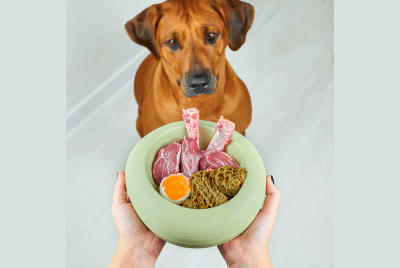
[ad_1]

A recent study investigated the diets of pets with a cancer diagnosis. The results were interesting. 71% of dogs seen by board-certified oncologists ate commercially prepared pet food, compared to about 90% of randomly surveyed healthy pets. Instead of eating commercially prepared food, 11% of dogs with cancer were fed homecooked or raw homemade diets. These numbers beg the question, “Are homecooked diets safe for pets?”
The Benefits of Commercially Prepared Pet Food
For healthy pets, veterinarians overwhelmingly recommend a diet of commercially prepared pet food to ensure your pet’s diet has a complete and balanced nutritional profile appropriate for their medical conditions and life stage. Homemade meals and treats can complement your pet’s commercial diet, say as a treat on special occasions, but should make up no more than 10% of their total calories. Remember: pets are not just little humans – they require specific vitamins, minerals, and amino acids that are best supplied by commercial pet food.
When to Cook a Homemade Diet for Your Pet
However, if your pet has a medical condition for which there is no appropriate commercial diet, then it may be necessary to prepared homemade meals for your pet. In these cases, veterinarians recommend a diet formulated by a board-certified veterinary nutritionist. These veterinary specialists have extra training and skills to create a nutritionally complete diet for your specific pet. Without input from a veterinary nutritionist, dietary misinformation on the internet can be difficult for pet owners to identify, leading to dangerous nutritional deficiencies.
The Dangers of Dietary Misinformation Online
Internet recipes for homemade pet food often look tasty and tout the benefits of “real food” for your pet, but homemade diets are likely to have an inappropriate nutrient profile with either too much or too little of critical nutrients. I have seen this myself when one of my patients developed low blood calcium levels because of a homecooked diet deficiency. And the same condition occurs in cats fed a homecooked diet. Most recipes for homecooked diets use a vitamin and mineral supplement to complement the other ingredients and create a balanced meal. Again, veterinary input is essential in choosing the right vitamin and mineral supplement. A recent study details the inadequacy of many vitamin and mineral supplements and their contamination with heavy metals such as mercury.
The Dangers of Raw Pet Food: A “Laundry List” of Bacterial Infections
Back to our cancer patient study where some of the cancer patients surveyed were being fed raw food diets. As you surely know, one reason we cook food is to kill microbes, specifically in raw meat and bones. I am not concerned about raw fruits and vegetables often given to pets on weight loss programs – these are totally fine.
Diets containing raw meat and bones carry this risk of microbial contamination, beyond malnutrition. A recent review of raw diets in the British Journal of Small Animal Practice details a laundry list of bacterial infections transmitted in raw diets, including Salmonella and – more alarming – antibiotic-resistant bacteria that live in the intestines of food animals. Pets eating raw diets with antibiotic-resistant bacteria may shed these bacteria in their stool, risking transmission to humans. Other infectious microbes known to contaminate raw pet food include Listeria, shiga toxigenic E. coli, parasites such as Toxoplasma gondii and exotic agents like the zoonotic livestock pathogen Brucella suis, recently identified in European Union and UK raw meat intended for pet food imported from Argentina.
5 Tips for Safely Implementing a Homecooked or Raw Diet
If your pet requires a homecooked or raw diet for medical reasons, here are 5 parting thoughts on how to ensure the safety of you and your pet:
- Get the advice of a board-certified veterinary nutritionist
- Check the label of your pet’s vitamin and mineral supplement for heavy metal screening by an independent third party laboratory
- Wash all dishes, storage containers and your hands after handling pet food, especially raw food
- Avoid feeding raw food if your household includes children, the elderly or immunocompromised people – they may be especially hard hit by foodborne infections
- Read a prior blogpost for tips on safe handling of pet food
Tags:
cat food, diet, dog food, pet food, veterinary nutrition,
[ad_2]
Source link

Leave a Reply